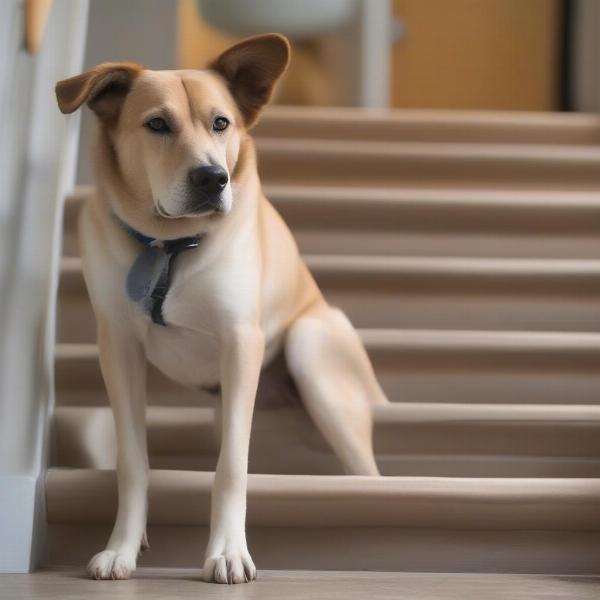Knee problems are a common ailment in dogs, affecting breeds of all sizes and ages. Understanding the causes, symptoms, and treatment options for canine knee issues is crucial for any dog owner. This article will equip you with the knowledge necessary to recognize potential problems and ensure your furry friend receives the best possible care.
Common Knee Problems in Dogs
Several conditions can contribute to knee pain and dysfunction in dogs. These include:
- Cranial Cruciate Ligament (CCL) Rupture: Similar to an ACL tear in humans, this is one of the most common knee injuries in dogs. It occurs when the CCL, which stabilizes the knee joint, tears partially or completely.
- Luxating Patella: This condition involves the kneecap (patella) slipping out of its normal groove. It’s particularly prevalent in small breeds.
- Arthritis: Knee arthritis can develop as a result of injury or age-related wear and tear, leading to pain, stiffness, and reduced mobility.
- Meniscal Tears: Often occurring in conjunction with CCL ruptures, meniscal tears involve damage to the cartilage cushions within the knee joint.
Recognizing the Symptoms
Early detection of knee problems is vital for effective treatment. Look out for these signs:
- Limping or lameness: This is often the most obvious sign of a knee problem. The limp may be intermittent or constant, depending on the severity of the condition.
- Stiffness: Your dog might appear stiff, especially after rest or exercise.
- Pain: Whining, yelping, or reluctance to put weight on the affected leg are indicators of pain.
- Swelling: You might notice swelling around the knee joint.
- Clicking or popping sounds: These sounds can sometimes be heard when the dog moves its leg.
- Difficulty rising, jumping, or climbing stairs: These activities can be challenging for dogs with knee problems.
What Causes Knee Problems in Dogs?
Several factors can contribute to knee problems in dogs, including:
- Genetics: Certain breeds are predisposed to conditions like luxating patella.
- Age: Older dogs are more prone to arthritis.
- Obesity: Excess weight puts extra strain on the joints, increasing the risk of injury.
- Trauma: Sudden injuries, such as falls or twisting motions, can cause CCL ruptures or other knee damage.
- Conformation: Structural abnormalities in the legs can contribute to knee problems.
 Dog Knee Problems Symptoms
Dog Knee Problems Symptoms
Diagnosis and Treatment Options
If you suspect your dog has a knee problem, consult a veterinarian. They will perform a physical examination and may recommend diagnostic tests such as X-rays or MRI. Treatment options vary depending on the specific condition and its severity. They may include:
- Medications: Pain relievers and anti-inflammatory drugs can help manage pain and inflammation.
- Physical Therapy: Exercises and other therapies can help strengthen muscles and improve joint function.
- Surgery: In some cases, surgery may be necessary to repair damaged ligaments or correct structural abnormalities. For example, CCL ruptures often require surgical intervention.
- Weight Management: Maintaining a healthy weight is crucial for preventing and managing knee problems.
- dog knee pain
Post-Operative Care and Recovery
If your dog undergoes knee surgery, proper post-operative care is essential for a successful recovery. This typically involves:
- Restricting activity: Limiting your dog’s movement is crucial to allow the tissues to heal.
- Physical therapy: Gradual rehabilitation exercises will help restore strength and mobility.
- Pain management: Your veterinarian will prescribe pain medications to keep your dog comfortable.
- Follow-up appointments: Regular check-ups with your veterinarian are essential to monitor the healing process.
Can I Prevent Knee Problems in My Dog?
While not all knee problems are preventable, you can take steps to reduce your dog’s risk:
- Maintain a healthy weight: Keeping your dog at an ideal weight reduces stress on their joints.
- Controlled exercise: Avoid excessive or high-impact activities, especially in puppies and young dogs.
- chi for dogs
- Joint supplements: Discuss with your vet about using joint supplements to support joint health.
- stair steps for dogs
- Regular veterinary check-ups: Early detection of potential problems can lead to more effective treatment.
Conclusion
Knee problems in dogs can be challenging, but with proper care and management, many dogs can regain comfortable mobility and enjoy a good quality of life. By understanding the causes, symptoms, and treatment options, you can be a proactive advocate for your dog’s health and well-being. Don’t hesitate to contact your veterinarian if you have any concerns about your dog’s knees.
FAQ
- What is the most common knee problem in dogs? Cranial Cruciate Ligament (CCL) ruptures are one of the most frequent knee injuries in dogs.
- How can I tell if my dog has a knee problem? Look for signs like limping, stiffness, swelling, pain, and difficulty with activities like rising, jumping, or climbing stairs.
- Is knee surgery always necessary for dogs? Not always. Treatment depends on the specific condition and its severity. Conservative management with medication and physical therapy might be sufficient in some cases.
- How long does it take for a dog to recover from knee surgery? Recovery time varies but can range from several weeks to several months.
- What can I do to prevent knee problems in my dog? Maintaining a healthy weight, controlled exercise, and regular vet check-ups can help reduce the risk. fabell and patella dog
ILM Dog is your trusted international resource for expert dog care advice. We provide comprehensive information on dog breeds, health, training, nutrition, grooming, and much more. Our website is dedicated to helping you provide the best possible care for your canine companion. For personalized guidance or inquiries about our products and services, including breed selection, healthcare, training programs, nutrition plans, and grooming supplies, please contact us: Email: [email protected], Phone: +44 20-3965-8624. ILM Dog is committed to the health and happiness of your dog.